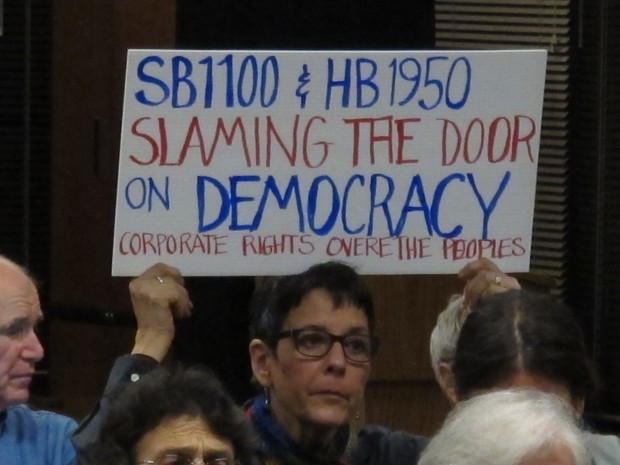What You Need To Know About Today’s Impact Fee Hearing
-
Scott Detrow

Scott Detrow / StateImpact Pennsylvania
Dozens of local officials spoke out against the impact fees at a December meeting in Allegheny County
This morning, Pennsylvania’s Commonwealth Court will hear arguments in a lawsuit aimed at stopping Pennsylvania’s new natural gas drilling impact fee from taking effect.
Here’s what you need to know about the case.
The Players: Seven municipalities from three counties have filed the lawsuit, along with the Delaware Riverkeeper Network and a doctor named Mehernosh Kahn. The municipalities:
- Robinson Township, Washington County
- South Fayette Township, Allegheny County
- Peters Township, Washington County
- Cecil Township, Washington County
- Mount Pleasant Township, Washington County
- Yardley Borough, Bucks County
- Nockamixon Township, Bucks County
Click on Robinson, Cecil and Mount Pleasant to view every producing Marcellus Shale well within the municipalities’ borders.
The group is suing the Commonwealth of Pennsylvania, as well as three departments who will play one role or another in enforcing the new law:
- The Public Utility Commission
- Office of the Attorney General
- Department of Environmental Protection
The Argument:
The new impact fee restricts municipalities’ ability to zone and regulate natural gas drilling. It bars local governments from keeping natural gas wells out of residential zones, except for dense neighborhoods. The bill also imposes new statewide standards for where wells, compressor stations and other drilling-related structures can be built. The legislation requires local drilling regulations to be “reasonable,” and has tapped the Public Utility Commission as the arbiter of whether or not municipalities’ rules fit within that definition.
The lawsuit claims Governor Corbett and the General Assembly violated both the state and federal constitution by enacting the impact fee, which is officially called Act 13. Why’s that? The suit points out the state constitution says Pennsylvania’s laws must be “designed to protect the health, safety and welfare of the community.” This legislation, it argues, was passed in order to create a more competitive economic environment for natural gas drillers, by eliminating municipality-to-municipality zoning disparities.
Here’s a passage from the filing:
By crafting a single set of statewide zoning rules applicable to oil and gas drilling throughout the Commonwealth, the Pennsylvania General Assembly provided much sought-after predictability for the oil and gas development industry. However, it did so at the expense of the predictability afforded to Petitioners and the citizens of Pennsylvania whose health, safety and welfare community development objectives, zoning districts and concerns regarding property values were pushed aside to elevate the interests of out-of-state oil and gas companies …”
The suit goes on to list negative consequences of drilling: chemical spills, compressor station fires, congestion on roadways and other impacts.
Other arguments raised by the lawsuit include:
- The law’s restrictions on doctors’ ability to disclose chemicals used during hydraulic fracturing “strips” medical professionals of “their ability to provide competent care.” (This is the reason Doctor Kahn joined the suit.)
- When a driller challenges a municipality’s zoning in front of Commonwealth Court or the Public Utility Commission, the hearing’s loser may be required to pay both sides’ legal fees. The suit claims this is “excessively onerous.”
- The law impedes on local control established by the Municipal Planning Code.
The Counterargument:
Governor Corbett’s office has told the AP they’re “confident that courts will uphold the law.”
The Corbett Administration is famously tight-lipped, and prefers to make its arguments behind the scenes. Governor Corbett’s view of Act 13’s local zoning restrictions are out in the open, though, in the form of a letter he sent to legislators in the days leading up to the final impact fee vote. In the letter, Corbett argues the legislation does not preempt local drilling regulations, or unfairly boost drilling.
Rather, the governor views the legislation as protection against municipal ordinances designed specifically to drive out drillers. “The most restrictive of these ordinances completely bans natural gas drilling or an activity critically related to the development process, depriving citizens of jobs, income and the enjoyment of their own property rights,“ he writes. Corbett argues the law “recognizes and preserves the traditional role of local zoning, and provides for a fair and impartial review of ordinances to make sure they are consistent…”
Corbett does concede the legislation is aimed at benefiting the drilling industry, but what opponents call favoritism he calls economic strategy. “To our immediate north, west and southwest, our neighboring states have all adapted strong – and in some cases total – pre-emption of local ordinances governing oil and gas development,” he writes. “Without question, we must ensure that Pennsylvania regains its competitive edge if we are to grow and succeed in the future.”
Read More:
Looking for more context? Here are StateImpact Pennsylvania’s most relevant articles on the impact fee and the provisions in question:
- Key milestones to look for, as the law goes into effect
- How the fee restricts what doctors can disclose about drilling chemicals – and the bill authors’ defense of the provision
- How much money would the fee generate? And which counties have enacted it?
- How the Public Utility Commission will enforce local zoning restrictions
















